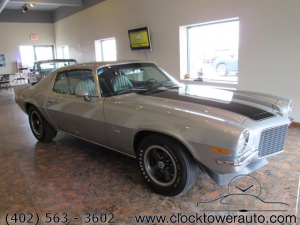- May 1, 2005
- 4,613
- 1,866
- Awards
- 12
- First Name
- Jeff
Yes, I will post the ads.
@Tallcool1 / Clint, were you able to post a shot of the ads you used and do you have ANYTHING else to add to this? Final results, final thoughts, etc?
Yes, I will post the ads.
Ryan - I disagreeAt least now we know where all this has to evolve into...verifiable ROI.

I thought I had replied to this.Last year I purchased InfusionSoft for my business. The buying process for me began on Facebook, where I don't spend much time. I clicked on an ad they had placed, watched a brief video, and provided my information. I never left Facebook. This is becoming a more common scenario. I imagine customers scheduling service appointments and test drives in the native Facebook environment if it's available, don't you?
Ryan - I disagree
Verifiable ROI has a huge place in dealership marketing, but everything a dealership does not need to have a verifiable ROI. Think sponsoring a little league baseball team; it is exposure and it's good for the community BUT it doesn't have verifiable ROI. But it's part of a dealerships ongoing branding efforts.
A dealership's paid Facebook advertising should be in one category and a dealership's Facebook community presence probably belongs in another.
Putting a hard dollar figure on "branding" ROI is almost impossible, but as a marketing professional, I would argue that branding is vital.
Ryan - I disagree
Verifiable ROI has a huge place in dealership marketing, but everything a dealership does not need to have a verifiable ROI. Think sponsoring a little league baseball team; it is exposure and it's good for the community BUT it doesn't have verifiable ROI. But it's part of a dealerships ongoing branding efforts.
A dealership's paid Facebook advertising should be in one category and a dealership's Facebook community presence probably belongs in another.
Putting a hard dollar figure on "branding" ROI is almost impossible, but as a marketing professional, I would argue that branding is vital.
Now I see, @Ryan Gerardi, you want LEADS!Facebook Ads are highly effective for top of the funnel branding and awareness marketing, and they also cause engagement around purchase/service consideration and intent to buy/service. And yes this is good, or "vital" as you say.
The metrics of these activities are based around reach, clicks, conversions, and website traffic. Measuring your return on investment to actual revenues and grosses is near impossible, at least accurately.
What if you could go deeper into the engagement funnel, e.g. schedule test drives, schedule service appointments, initiate the trade-in process and the finance process, with the people your ads are reaching and engaging in Facebook. What if you had the ability to see more "tangibly" how these consumer activities were impacting your revenue and grosses?
This is what I am referring to when I say "verifiable ROI."
There just has to be some measure of success or I have no idea what to do or not do.

Yes, this was always Zuckerberg's intention. He needed to collect data on the pleb nation, in order to create the ability for marketers to behavioral target (in other words, the organic popularity joke was on them). In reference to what works and doesn't and maybe I am overstating the obvious, but like anything else, it depends on the intention / purpose of the ad and whom you target with it. You seem like you know, keep testing it and once you know, stay the course.The problem that I have with social media is that by monetizing it, you HAVE to pay to play. If I post on Facebook and do not pay to boost the post, Facebook only shows it to a handful of people. Now, of course if I pay, then its displayed to thousands - which then turns it into "what's my ROI...". It is more beneficial for me to post something business related (not a hard-sell though) on a personal page than it is on a business page. A salesman can post a pic of a new model or a happy customer on his page and will get all kinds of interactions...I post the same thing to Facebook as a business and barely make a splash (unless I pay). I love Twitter for the immediate interaction with our customers. I hate Google+ and that's all that needs said about that.


